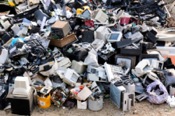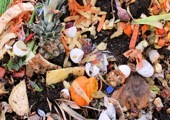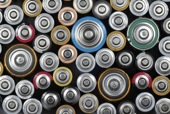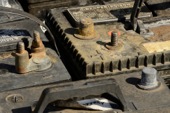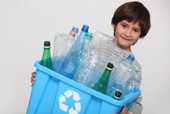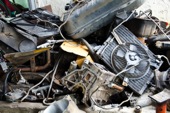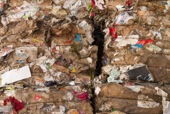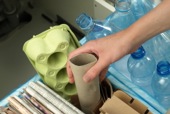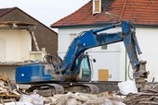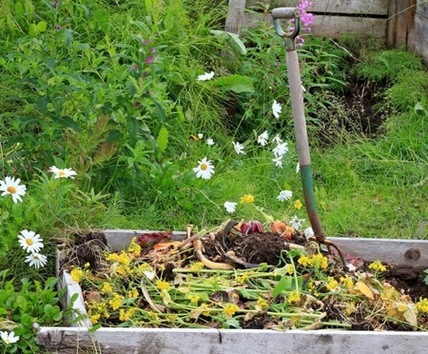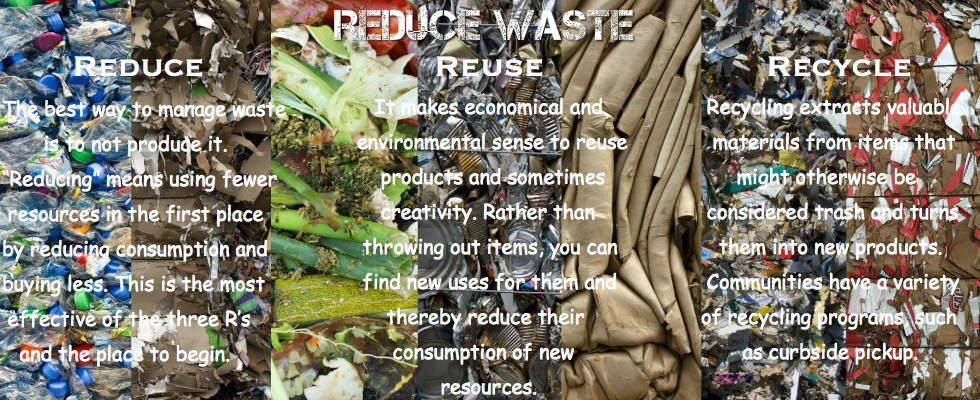
Reduce Waste
In the US, we
generate more waste than any other country in the world,
recycle far less than other developed nations, and
waste half of our food, which costs us $164 billion annually,
more than half of our energy through inefficiency,
three-quarters of our fuel in gas guzzlers,
95% of water in our homes,
at least 11.4 billion dollars in recyclables
and so forth. Waste can contaminate virtually anything, including soil, air, surface and ground water, which
can lead to serious problems
for humans, other species and ecosystems.
Waste treatment and disposal produces significant greenhouse gas emissions, including carbon dioxide and methane, which are contributing significantly to global climate change and attracts rodents and insects which
harbor gastrointestinal parasites, yellow fever, worms, the plague and other conditions for humans. Exposure to hazardous wastes, particularly when they are incinerated,
can cause various other diseases including cancers. The need for expansion and siting of waste treatment and disposal facilities is increasing worldwide with a growing market in the
transboundary movement of significant amounts of waste from developed to developing nations.
Learn more.
"If we recovered just 5 percent of the food we waste, we could feed
4 million Americans. We can save more oil than we currently import from the Gulf simply by
making our cars more fuel-efficient. We already know how to construct green buildings that consume
as much as 90 percent less energy
than conventional ones." ~
Peter Lehner, NRDC
The Three R's
The Three R's all help to minimize the amount of waste we throw away and conserve natural resources, landfill space and energy. Reducing, reusing and recycling makes economical and environmental sense by saving land and money communities must otherwise use to dispose of waste in landfills. The siting of a new landfill has become increasingly difficult and more expensive due to environmental regulations and public opposition. Moreover, waste reduction and recycling are very powerful tools to reduce CO2 emissions. According to the
EPA
(see also), we could cut carbon dioxide emissions by about 354 million metric tons annually just by reducing our waste and recycling more, which would help improve air quality and mitigate
climate change.
Learn more.
Reduce
The best way to manage waste is to avoid it in the first place. This can be done by buying products in bulk, which usually cost less per ounce,
removing your name from junk mail lists, avoiding over-packaged goods, which are harder to recycle and tend to cost more due to the extra packaging, avoiding disposable goods, such as plastic bags, cups, napkins, razors, and lighters, using cloth napkins instead of paper napkins
and much more.
Reuse
Many items have the potential to be used over and over for various purposes. Sometimes it takes creativity and other times, determination. Determination to dispose of the idea of disposability and make the most of what you have by giving your items new meaning and life, which can save you money, especially over time, instill more value into your values and reduce the flow of waste traversing the globe and the harmful trails that follow.
Discover Guide to Green Living
Recycle
Recycle what you can’t refuse, reduce or reuse. Recycling is the conversion of waste into reusable material through a series of steps that takes a used material and processes, re-manufactures, and sells it as a new product. Recycling is essential to improving the economy and conserving the environment.
According to the EPA, "Recycling protects and expands US manufacturing jobs and increases US competitiveness, reduces the need for landfilling and incineration, prevents pollution caused by the manufacturing of products from virgin materials, saves energy, decreases emissions of greenhouse gases that contribute to global climate change, conserves natural resources such as timber, water, and minerals and helps sustain the environment for future generations."
Support the Landfill Methane Outreach Program: "The U.S. Environmental Protection Agency’s Landfill Methane Outreach Program (LMOP) is a voluntary assistance program that helps to reduce methane emissions from landfills by encouraging the recovery and beneficial use of landfill gas (LFG) as an energy resource."
Prevent Litter
Research and experience
show that litter is a result of individual behavior; a problem we create and one only we can solve. Keep America Beautiful offers these actions for preventing litter:
- Choose not to litter. Make the commitment now to join with thousands of other Americans to not be a litter-bug.
- Join with others on Facebook. Get your friends and family to join.
- Remind others not to litter and why.
- Get a litter bag or portable ash receptacles to share.
- Volunteer in your community to help prevent and cleanup litter—from cigarette butts to illegal dumps. Find a Keep America Beautiful affiliate in your community.
Compost Your Waste!
Composting
is nature's process of recycling decomposed organic materials into rich soil known as compost. There are many
reasons to compost
and various
types of composting. Composting commonly comes in the form of
vegetable compost and animal manure compost.
Benefits of Composting
Whether it's for your garden, your pocket or the planet, the benefits of composting are truly remarkable and certainly effective. Whether you add compost, such as fruit and vegetable scraps, eggshells, coffee grounds, grass clippings, fallen leaves or animal manure, to seed-starting mixes, container plantings, garden beds, or lawns, your effort will pay off by
reducing up to 75% of the solid waste stream to landfills, reducing methane production, which is a greenhouse gas 21 times more potent than CO2, and greatly benefiting the soils physical structure, biology and chemistry, while cleaning up contaminants. Compost effectively enhances the physical structure of soil by
utilizing macro- and micro-nutrients, which are often absent in synthetic fertilizers,
allows microorganisms to break down the organic matter into plant-available nutrients, which strengthens the plants,
increases the amount of moisture the soil retains, so you have to water less,
helps prevent erosion,
cleans up and repairs contaminated soil, including soils that have been destroyed by pesticide use, and
improves soil structure, such as helping sandy soil retain more moisture and breaking up clay soils. Furthermore,
composting helps soils resist compaction, which helps roots penetrate the soil,
acts as a buffer to the soil's pH
helping modifying and stabilizing it, helps the soil
maintain more nutrients
by preventing the leaching out of nutrients,
improves the effectiveness of fertilizers, whether they are organic or synthetic,
provides habitat and food for beneficial soil organisms, such as earthworms, which help
remediate the waste and remove toxic heavy metals,
grants plants greater resistance to disease and insect pests, and
much more. In addition to enriching soil, cleaning up contaminated soil and preventing pollution, composting offers the economic benefit of reducing the need for water, fertilizers, and pesticides.
According to the EPA, "It serves as a marketable commodity and is a low-cost alternative to standard landfill cover and artificial soil amendments. Composting also extends municipal landfill life by diverting organic materials from landfills and provides a less costly alternative to conventional methods of remediating (cleaning) contaminated soil."
Learn more.
EPA: Reuse + Recycling = Waste Reduction: A Guide for Schools and Groups
Recycle Your Old Phone by Reselling It
Get Started on Your Compost
Although you can purchase compost from many sources, such as Target, Lowes, Home Depot and Walmart, chances are you don't need to because you already generate it yourself. The following are resources to assist you in creating your own compost:
Recycle Your Old Phone by Reselling It


